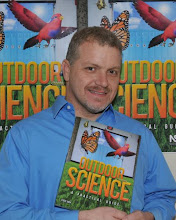Constructivism - Worldview Journal/Blog
The worldview
with which I most identify is the constructivist approach. It fits well with my
approach to science teaching and learning, as well as to the work I do in
teacher professional learning. As a subject area, science fits well with the
constructivist approach as well. Inquiry science in particular meshes with this
worldview.
In The 5 E’s of
inquiry based science (Chitman-Booker, Kopp, 2013) the authors have based their
approach on the constructivist model. “Constructivism is a learning strategy
that builds on students’ prior knowledge, ideas, and skill sets,” they say.
Engage, explore, explain, extend, and evaluate make up the 5 E’s. The
constructivist model would run through all of these steps in inquiry based
science instruction.
My research bases
itself in work that I have been doing for many years with outdoor classrooms,
outdoor learning, and bringing natural materials from outdoors into the regular
science classroom (Rich, 2010). During the pilot for my study, students will
have a learning experience outdoors following pre-tests on both content and
attitude toward learning outdoors. The constructivist approach to teaching will
form the basis for the structure of the instruction. Students will be asked to
explore a science topic outdoors potentially constructing their own meaning
about how plants and animals fit into their natural world. As such, they will
likely be influenced by prior experience. This will however fit with the
constructivist notion that they would be actively continuing to build their
understanding.
The study will
have posttests for attitude and content. These may shed light on the degree to
which students constructed their own meaning. Anecdotal evidence may be helpful
in written responses from the teachers involved. Perhaps this would give evidence
of where the teachers are in constructing their own meanings around science
content.
Social
constructivism and constructivism are sometimes used interchangeably in
academic literature. Whichever term dominates, constructivism is most typically
an approach to qualitative research (Creswell, 2014). The research that I have
proposed will indeed be quantitative, but will have an element of qualitative,
as one of the surveys/tests will be attitudinal in nature. While the
quantitative data from this will be the focus, further research might consider
the ideas expressed in additional qualitative analysis. It is however, the science content and setting
that will be very closely tied to the constructivist views of teaching and
learning. One of the aspects of the journey that may prove interesting is
considering what knowledge based is constructed through the outdoor experience
that students will have. While one hopes others will value the results of the
research, it is true that this researcher looks forward to the results, what
they mean, and how they relate to the constructivist approach that is so often
successful in science education.
Chitman-Booker, L., Kopp, K. (2013). The 5 E’s of inquiry-based science.
Huntington Beach, CA. Shell Education.
Creswell, J., (2014). Research design: qualitative, quantitative, and mixed methods
approaches. Thousand Oaks, CA. Sage Publications, Inc.
Rich, S. (2010). Outdoor science: a practical
guide. Washington, D.C. NSTA Press.

No comments:
Post a Comment